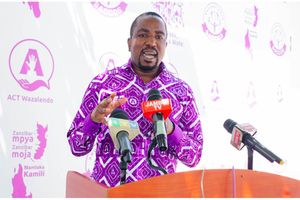How Frelimo betrayed Machel’s dream of a free Mozambique

Samora Machel, Mozambique's founding father. PHOTO | FILE
By David Matshinhe
Forty-six years ago, Samora Machel - the leader of Mozambique’s liberation movement and the country’s first president - stood before a euphoric crowd at Machava Stadium and declared the complete and total independence of Mozambique.
He inspired the people of Mozambique to imagine and build a new nation in which development, social justice, and solidarity with – and care for – the oppressed took centre stage.
Four decades later, Machel’s declarations ring hollow. His words and the new dawn they heralded have since disintegrated.
As a non-profit, we depend on your support
I’m a Mozambican political sociologist. I have been a keen observer of the country’s changing economic, social and political structures since the early 1990s.
The declaration of independence in 1975 proclaimed a social contract that contained the ideals of freedom. These included economic and social justice, eradication of hunger and poverty, health and education for all, equality of all people regardless of ethnicity, race and gender, emancipation of women, the rule of law and human rights.
But Frelimo has squandered the enormous political capital it enjoyed at independence. The party remains in power by using violence, intimidation, harassment and threats. Generalised lawlessness characterise Mozambique today.
Governance crises and deep rooted corruption permeate all aspects of political, economic and social life. Popular discontent with the Frelimo government is on the rise. This explains the armed conflict in central and northern regions.
The context
Mozambique was the first country in southern Africa to become independent through armed insurrection. This threatened the white minority regimes of Southern Rhodesia (today’s Zimbabwe) and South Africa. Both feared that Mozambique would become a haven for the liberation movement guerrillas of the respective countries. It was, therefore, in their interests to topple the Frelimo government.
As Mozambique celebrated independence the regime of Ian Smith in Zimbabwe conducted air raids in southern and central Mozambique. Civilians were killed and communication systems, bridges and crops were destroyed.
The Rhodesian regime also teamed up with Portuguese malcontents who still had interests in Mozambique, to create a surrogate terrorist movement, Renamo. When the Rhodesian regime fell and Zimbabwe became independent in 1980, the South African apartheid regime stepped in to finance Renamo’s operations. Its 16-year war of destabilisation consisted of acts of terrorism that produced profound psychological trauma.
The war of destabilisation and natural disasters created the need for foreign aid. Working with the World Bank and the International Monetary Fund, Frelimo introduced structural adjustments in 1987. These programmes involved economic liberalisation and deregulation.
The programmes involved widespread privatisation of state-run companies, massive layoffs and unemployment and cuts in government spending on social services. The cost of food, water, housing, electricity, transport and telecommunications went up. Poverty and inequality increased.
At the same time Frelimo elites set about building an extensive patronage system.
Natural resources
In my view Frelimo political elites have presided over the natural resource mismanagement, looting and environmental crimes.
In the past 20 years many rural communities have been forcibly removed from their homes to make room for agribusiness, mining, oil and gas companies.
In addition, natural ecosystems have been plundered. The deforestation of central and northern regions has left areas subject to vicious cycles of droughts, cyclones and floods.
In 2013, the Environmental Investigation Agency investigation found that 93% of logging in Mozambique was illegal.




